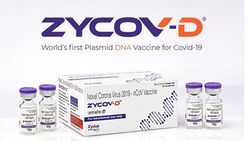DNA Vaccine
(GM, “Pandemic/Preparation”) | |
|---|---|
 ZyCoV-D, developed by Cadila Healthcare, is the first DNA vaccine approved for humans | |
| DNA-changing vaccine technology. First time allowed for use in 2021, despite no late-stage trial results having been published. |
A DNA vaccine is a type of vaccine that transfects a specific antigen-coding DNA sequence onto the cells of an immunized species.[1] While these kinds of technologies have been in development since the 1990s, it took the regulatory and law changes in regard to the COVID-19 deep event to get them into production.[2]
Overview
DNA vaccines work by injecting genetically engineered plasmid containing the DNA sequence encoding the antigen(s) against which an immune response is sought, so the cells directly produce the antigen, thus causing a protective immunological response.[3] DNA vaccines have theoretical advantages over conventional vaccines, including the "ability to induce a wider range of types of immune response".[4] Several DNA vaccines have been tested for veterinary use.[3] In some cases, protection from disease in animals has been obtained, in others not.[3] Research is ongoing over the approach for viral, bacterial and parasitic diseases in humans, as well as for cancers.[4]
DNA vaccines can store lots of information, which means they can encode large, complex proteins or even multiple proteins.[2]
ZyCoV-D
In August 2021, Indian authorities gave emergency approval to ZyCoV-D. Developed by Cadila Healthcare, it is the first DNA vaccine approved for humans.[5] is administered using a needle-free device pressed against the skin, which creates a fine, high-pressure stream of fluid that punctures the surface and is less painful than an injection.[2]
ZyCoV-D contains circular strands of DNA known as plasmids, which encode the spike protein of SARS-CoV-2, together with a promoter sequence for turning the gene on. Once the plasmids enter the nuclei of cells, they are converted into mRNA, which travels to the main body of the cell, the cytoplasm, and is translated into the spike protein itself. The body’s immune system should then mount a response against the protein, and produce tailored immune cells that can clear future infections.[2]
As Nature points out, "some researchers have criticized a lack of transparency in the approval process, because no late-stage trial results have yet been published," but the company will still produce 50 million doses by early 2022.[2]
References
- ↑ https://www.researchgate.net/publication/268810231
- ↑ Jump up to: a b c d e https://www.nature.com/articles/d41586-021-02385-x
- ↑ Jump up to: a b https://www.ncbi.nlm.nih.gov/pmc/articles/PMC3882840
- ↑ https://www.reuters.com/business/healthcare-pharmaceuticals/india-approves-zydus-cadilas-covid-19-vaccine-emergency-use-2021-08-20/